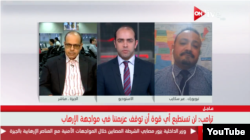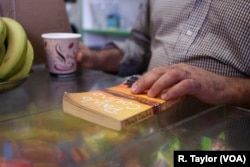Among the 1900s-era row of brick buildings on a Queens, New York Avenue, Lotus Deli is a one-stop shop for warm breakfast sandwiches, batteries, cigarettes, and late-night craft beer.
Owner Hatem El-Gamasy is the first New Yorker to greet you in the morning, and the last to say good night. To his diverse customer base, he is known as "Timmy," a father of two who safeguards neighbors' deliveries, holds keys for visiting in-laws, and greets your dog by name.
But to viewers 9,000 kilometers east of New York City, El-Gamasy — a Qewaisna Al Balad-native Egyptian-American and graduate of Menoufia University — is known as a self-assured TV analyst, specializing in U.S. foreign policy and Middle Eastern affairs.
"I have four people working for me, this [deli] is how I feed my family," El-Gamasy said. "At the same time, I'm doing great discussing politics."
In a moment's notice, El-Gamasy, 48, loses the paperboy cap, slips into his repurposed back room, and fixes his necktie. He is Skype debate-ready in minutes.
"When they have breaking news, they may call you immediately," El-Gamasy explains of TV newsrooms.
Generating controversy
El-Gamasy had written opinion pieces for years, but generally went unnoticed by Egyptian broadcasters. That changed last year, when he predicted Donald Trump would win the presidential election even though democratic opponent Hillary Clinton was far ahead in the polls. Nile TV, a state channel, caught wind of the piece and interviewed El-Gamasy. After that, his phone rang a lot.
In September, The New York Times published an exclusive feature on El-Gamasy, revealing his unconventional TV reporting life to his audience and the world outside Ridgewood, Queens.
Nationally, discussion boards heralded his journey as an epitome of the "American Dream" — the notion that hard work plus equal opportunity may earn you limitless possibilities.
Abroad, his reception was varied.
"The late [professor and writer on Middle Eastern Affairs] Fouad Ajami, who was both an academic and a successful commentator, used to joke that he wanted to open a restaurant — though he never did," wrote Edward Yeranian, a foreign correspondent in Egypt who reports for VOA, "so I wouldn't judge the man because he owns a deli shop."
But news outlets and social media forums across Egypt and the Middle East were more critical of El-Gamasy's credibility.
An Arabic-language video by the online outlet Rassd News Network, which has gathered more than half a million views on Facebook, mocks El-Gamasy while falsely claiming that he actually lives in California. In the comments section, a language barrier-transcending "crying with laughter" emoji is prevalent.
The Lens Post, a bilingual English and Arabic site that claims to be by Arab youth, "for Arab youth," calls El-Gamasy's story "scandalous," and an example of "many fake political analysts" who appear on Egyptian TV news.
Backlash
"Oh, the political analyst Mr. Gamasy is just a sandwich guy; he's a pancake guy; he's this and this, nothing else,'" El-Gamasy recalls the commentary, "as if owning a small business is something I should be ashamed of. ... I have nothing to regret."
El-Gamasy has not been shy with his on-air criticism of the Muslim Brotherhood, the Qatari government, and "fanatic religious groups," views which he believes fueled an offensive among his disparagers.
The reaction was swift and apparent. In the four weeks since The New York Times' article was published, Egyptian television outlets which used his commentary most — CBC eXtra News, ONtvLIVE, and Nile News — stopped calling.
Eventually, he stripped the matching $2.99 maps of the United States — the backdrop for his Skype recordings — from the walls. The padlock dangling against his orange back door, separating the deli from his studio, has since been clamped shut.
But behind it, one remnant of El-Gamasy's TV appearances remains: a single hanging black suit, together with a knotted gray tie and red Van Heusen button-down shirt.
"I'm not totally dead, you know," he smiled.
Once a pundit …
When he's not ringing up customers or discussing politics over coffee behind the counter, El-Gamasy spends hours honing his poetry and short stories, while keeping tabs on White House and Department of State email updates on foreign policy.
Late at night, El-Gamasy still pores over his many composition notebooks — penning, drafting and re-drafting articles for accuracy and eventual publication.
"Politics is like a running river," he said. "Nothing stops."
Following the October 1 mass shooting in Las Vegas, El-Gamasy was invited to participate in a live 30-minute news discussion with U.S. Arab Radio, a platform dedicated to providing news and analysis to the U.S. Arab diaspora.
Refaat Abid, U.S. Arab Radio's New York-based host, says he sought out El-Gamasy after viewing one of his TV appearances in May. El-Gamasy had been talking about FBI director James Comey's firing and investigations into possible Russian interference in the U.S. election.
"He has a beautiful voice, like a poet," Abid said.
While he doesn't know whether he'll return to TV political analysis, El-Gamasy says other doors — such as the radio appearance — have opened for him.
'To realize one's destiny'
As the evening's golden hour sets upon Lotus Deli, El-Gamasy basks in the quiet from behind the counter.
His index finger skims, line to line, through Paulo Coelho's The Alchemist, a book he has read several times.
He stops at a well-known passage and reads aloud:
"To realize one's destiny is a person's only real obligation. All things are one. And, when you want something, all the universe conspires in helping you to achieve it."
El-Gamasy takes a sip of coffee: "It's really an inspiring book."
Content but tired, he contemplates a short nap. The night is young, and the week is long.
And there are many blank pages to fill.













